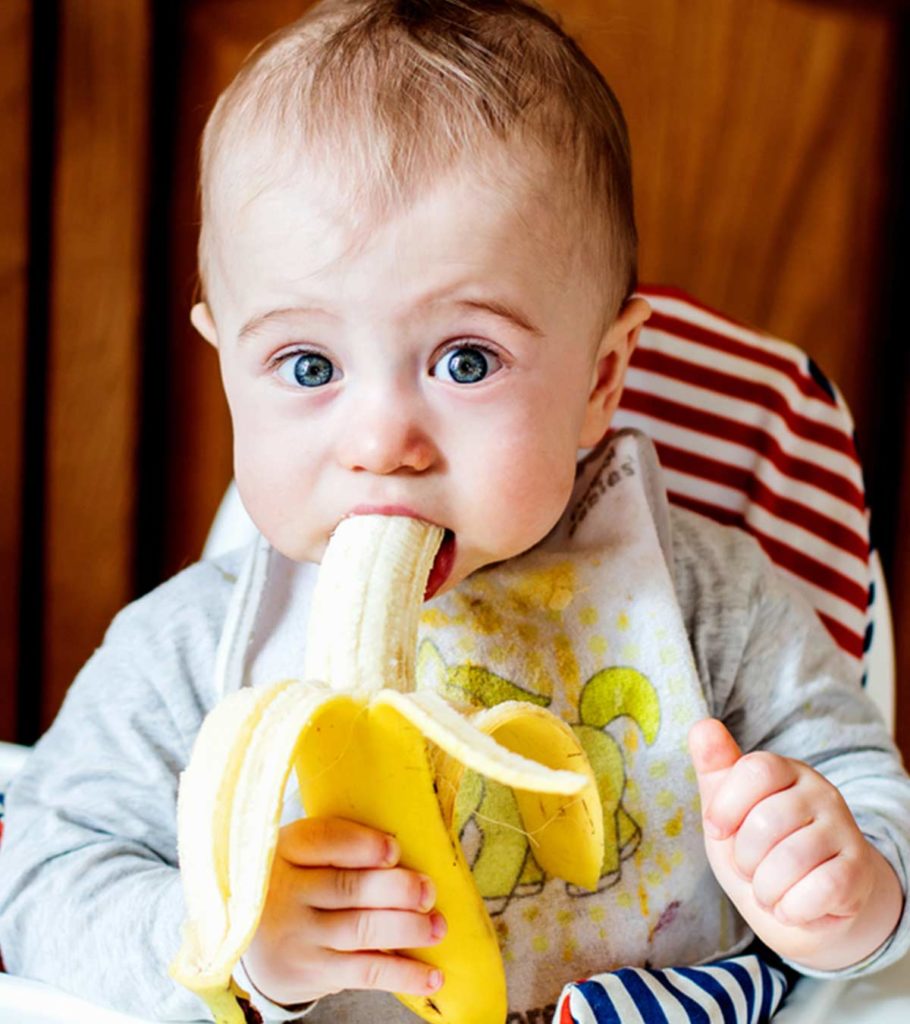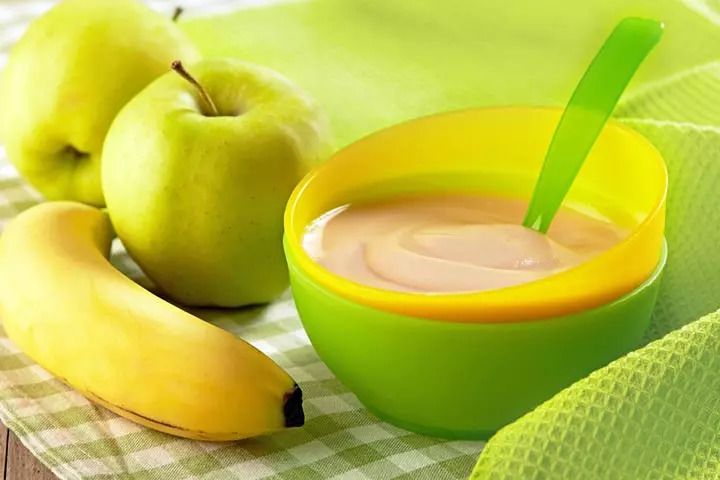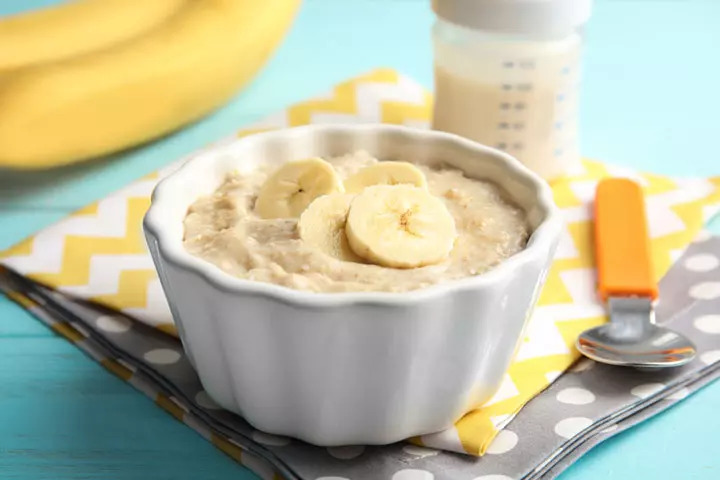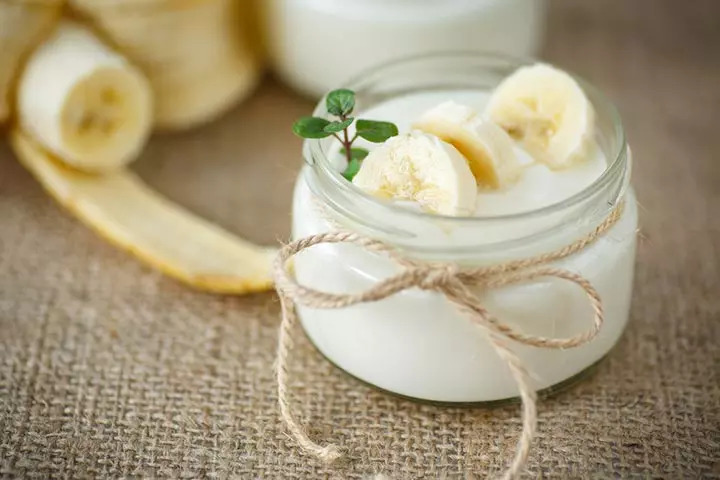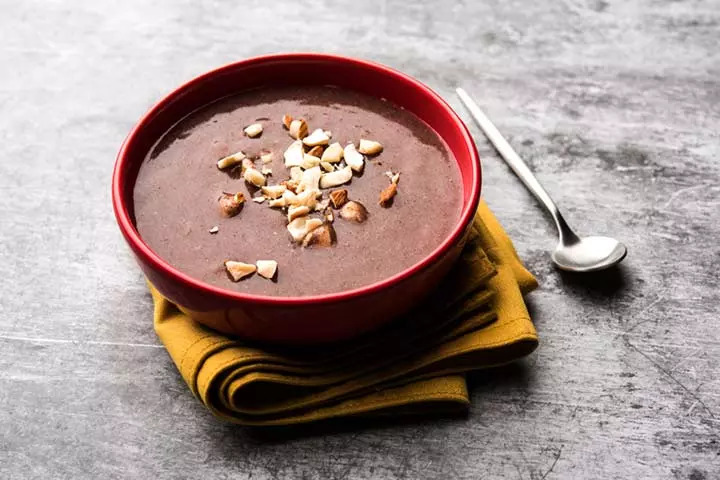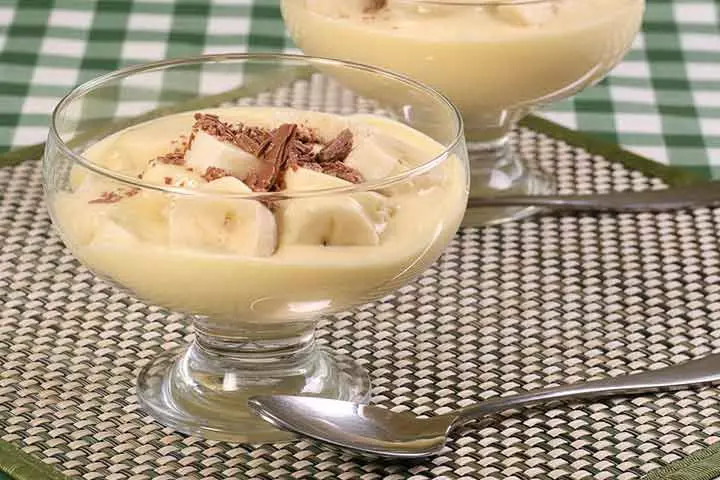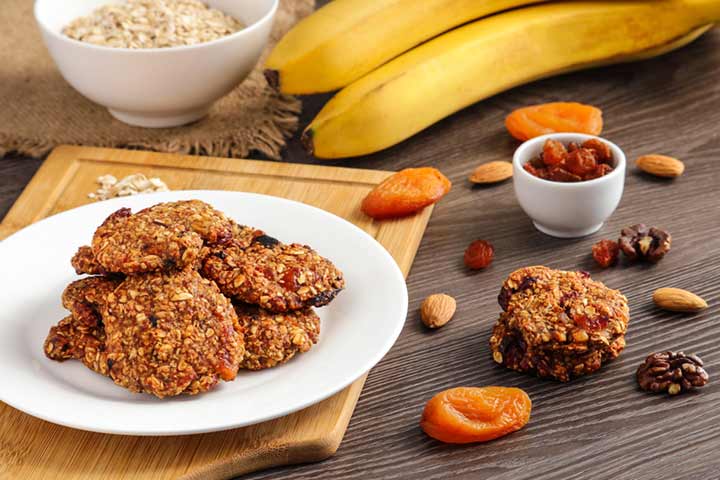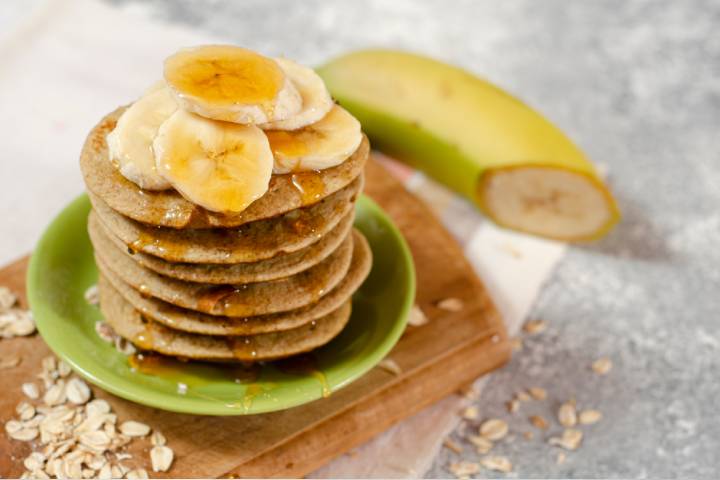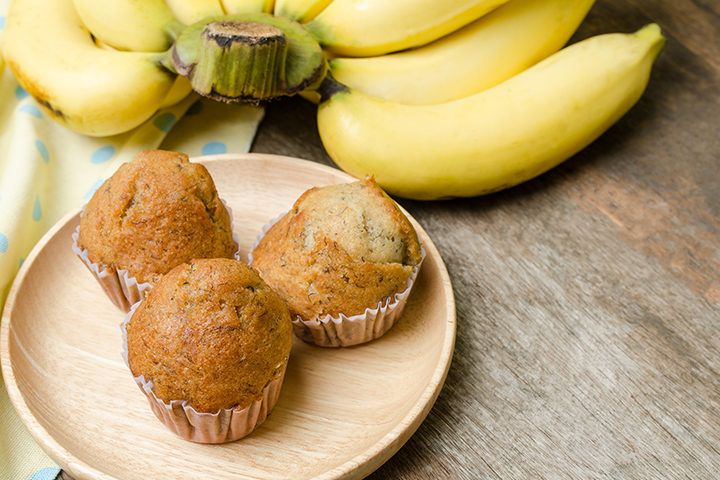Banana is a carbohydrate-rich, all-season fruit full of essential nutrients and bioactive compoundsiXMolecules in plants and some foods with antioxidant properties and health-promoting effects. In addition, it has a sweet taste and soft texture and is easy to digest. But while the benefits of bananas for babies are numerous, feeding them in age-appropriate ways is necessary to reap these benefits.
Bananas are available in several varieties, and the fruit comes in different sizes and colors (1). However, their high fiber content may cause gastrointestinal issues, such as constipation and gas, in sensitive babies.
Read on to know more about the right time to feed bananas to babies, their nutritional value, possible health benefits, and some tasty and healthy banana recipes to try.
When To Introduce Banana To Babies?
According to the Academy of Nutrition and Dietetics, babies can consume ripe bananas as part of a balanced diet from six months(2). You may introduce bananas as a lump-free puree or mash at this age, suggests the American Academy of Pediatrics (3). As the infant grows older, you can add bananas to other baby-friendly foods, such as porridge and baby cereal.
Babies from nine months of age can consume thinly sliced bananas as snacks. Once the baby turns a year old, you can feed banana bread, banana pancake, and baked banana chips made with banana flour. Banana flour can also be used as a thickener in stews, smoothies, shakes, and soups.
Nutritional Value Of A Banana
Bananas contain significant amounts of carbohydrates, dietary fiber, bioactive phytochemicalsiXBioactive compounds found in plant-based foods that act as antioxidants and have antimicrobial effects, potassium, and certain micronutrients.
The nutritional value of bananas can vary depending on its variety. An average ripe banana (115g) provides the following nutrients to the baby (4) (5)(6) (7).
| Nutrients | Amount | RDA (7-12months) |
| Water | 86.6g | – |
| Energy | 112Kcal | – |
| Carbohydrate, by difference | 26.4g | – |
| Fiber, total dietary | 1.96g | – |
| Calcium, Ca | 5.75mg | 270mg |
| Magnesium, Mg | 32.2mg | 60mg |
| Phosphorus, P | 25.3mg | 275mg (AI*) |
| Potassium, K | 375mg | 700mg |
| Vitamin C | 14.1mg | 35mg |
| Folate | 16.1µg | 80µg (AI*) |
*AI = Adequate intake – nutrient level assumed to ensure nutritional adequacy
Sources: U.S. Department of Agriculture, World Health Organization and Oregon State University
Many people confuse plantain with banana due to their similar appearance. However, their culinary uses are different due to their taste and texture. Plantains, also known as cooking bananas, are tougher and starchier, and thus, shouldn’t be fed raw to babies. They are best to feed after cooking, baking, roasting, or grilling.
Possible Health Benefits Of Banana For Babies
Adding bananas to your baby’s well-balanced weaning diet could provide the following benefits (8) (9).
- Provide essential nutrients: Ripe bananas are rich in carbohydrates that could meet a baby’s energy needs. It also contains folate, which improves brain power and potassium, which is important for the overall healthy growth of the body. It contains calcium, magnesium, and vitamin B as well. The iron content in bananas helps to prevent anemia whereas vitamin A helps in improving eyesight.
- Support digestive health: Bananas are rich in fiber, which can be suitable for the digestive system in the long run. The soft pulp of a ripe banana is almost 75% water, making it easy to digest and gentle on the baby’s stomach. According to Harvard T.H. Chan School of Public Health, bananas also help replete electrolytesiXEssential minerals like sodium, potassium, chloride, and bicarbonate that are essential for the key functions of the body such as potassium, which are lost during diarrhea or vomiting, and assist in healing the gut (9).
- Promote bone health: Bananas contain fair amounts of calcium and phosphorus. These nutrients could contribute to your baby’s bone growth and development in the long run.
- Boost immunity: Bananas have small amounts of vitamin C and bioactive compounds, such as carotenoidsiXPigments in plants, algae, and bacteria that give them their yellow, red, and orange hue and get converted to vitamin A in the intestine, which have antioxidantiXMan-made or natural substances that may prevent or slow down cell damage caused due to harmful molecules called free radicals effects. These compounds could play a role in supporting immune health. Research shows that banana lectin, a protein found in bananas, may act as an immunomodulatoriXSubstances that modulate the immune system to help the body fight certain infections, thus benefiting the immune system and improving immunity (10) (11).
In addition to macro and micronutrients, bananas contain carotenoids, biogenic amines, and phytosterolsiXBioactive compounds found in plant products that may help lower cholesterol levels that benefit health in the long run. Also, banana’s oral and topical use in traditional medicine is prevalent to treat heartburn, mosquito bites, and ulcers (12).
Precautions To Take While Feeding Banana To Babies
Below are some precautions to follow while feeding bananas to babies across ages.
- Prefer feeding ripe bananas as they are easy-to-digest, sweet, creamy and more palatable than an unripe green banana.
- If you buy raw bananas (unripe green bananas), store them until they ripen and turn yellow at room temperature. If you wish to ripen them fast, store them in a paper bag with a ripe apple.
- Add breast milk or formula milk to banana mash and puree to ensure the infant can swallow them easily.
- Prepare baby food with well-mashed ripe bananas to avoid lumps that can be a potential choking hazard.
- Do not worry if a banana turns brown a couple of minutes after it is peeled, diced, or pureed. It happens due to the oxidation of polyphenols in bananas, a process known as enzymatic browning (13).
- Introduce banana mash or puree without adding any other food. Follow a “three-day wait” rule and do not feed new food during this period. It could help identify intolerance, sensitivity, or allergy caused by bananas.
- Begin by feeding a teaspoon in a meal and gradually increase the intake to a tablespoon and then two.
- Keep the intake moderate as bananas can fill your little one’s tummy, curbing their appetite for breast milk or formula milk and other foods.
- If the baby looks uncomfortable, cries, or behaves cranky after ingesting banana, discontinue feeding, and try after some time.
- Feeding bananas at night time in winters isn’t advisable in alternative medicine, such as Ayurveda. Bananas may increase mucus formation and worsen cold and cough.
- True banana allergy is rare but possible. Usually, banana allergy happens due to cross-reactivity with tree pollens and latex. The symptoms of cross-reactivity with tree pollen are itching and inflammation in the mouth and throat, known as oral allergy syndrome (OAS).
Merri, a mom, shares her experience when her son, Sketch, was diagnosed with a true banana allergy. At around 18 months to 2 years of age, Sketch began restricting his food intake. Recalling the ordeal, she says, “He started out being the best eater in the house! He would eat a variety of colors and textures with no problems at all. At this point (he’s now 6), he will only eat a handful of brand-specific foods, and his protein is self-limited to yogurt.”
An allergy retest revealed that eggs were causing his symptoms. However, even after eliminating eggs from his diet, he continued to experience allergic reactions. Merrie adds, “He breaks out in eczema, experiences severe asthma attacks, and now hives. The allergist initially ruled out additional food allergies, refusing to retest. We switched allergists and repeated the tests. At 3 1/2 years old, Sketch tested positive (severe) for Eggs, mild for Peanuts, and mild for Banana (i).”
- Cross-reactivity of bananas with latex can cause symptoms such as hives, abdominal pain, and vomiting. It is known as the latex-fruit syndrome (14). If the baby has a family history of allergies, it is advisable to consult a pediatrician before feeding bananas to babies.
Healthy Banana Recipes For Babies
Here are some healthy and delectable banana recipes that you can feed your baby and toddlers.
1. Banana and apple puree (6 months)
You will need:
- ½ banana (peeled)
- ½ apple (peeled and steamed)
- ¼ tsp jaggery powder (optional)
How to prepare:
- In a mixing bowl, mash banana and apple into a lump-free, smooth paste using a fork.
- Add some breast milk or formula to adjust consistency. If the puree looks chunky, use a blender or grinder to smoothen the puree.
- Pour the puree into a small bowl and add jaggery powder to enhance the taste and nutritional value. Feed as a healthy breakfast or midday meal.
- You can add this puree to porridge to make the porridge nutritionally wholesome.
2. Baby banana Cerelac (6 months)
You will need:
- 3tbsp homemade Cerelac
- ½ banana (peeled and mashed)
- 1tsp raisin puree
- 1 cup water
How to prepare:
- In a mixing bowl, mix homemade Cerelac, raisins puree, and water to form a smooth, lump-free mixture.
- Pour the mixture into the saucepan and cook for ten minutes on low flame, until the cereal begins to thicken. Turn off the heat and let the mixture cool.
- Add mashed banana to the mixture and ensure no lumps are present. The Cerelac is ready to feed.
- You can add various seasonal fruits like berries, kiwi, apple, pears, and vegetables like sweet potato to this recipe for preparing sweet or savory Cerelac dishes for babies.
3. Banana and yogurt mix (8 months)
You will need:
- ½ cup Greek yogurt
- ½ banana (peeled and mashed)
- 1tsp dry fruit powder
- ⅛ tsp cinnamon powder
- Pinch of nutmeg
How to prepare:
- Put all the ingredients in a mixing bowl and mix well to form a lump-free, smooth mixture.
- Pour into a serving bowl and feed immediately. This dish is loaded with probiotics.
- You can add cooked rice or quinoa to this recipe for babies older than eight months.
4. Ragi and banana porridge (10 months)
You will need:
- 2tbsp ragi flour
- ½ banana (peeled and mashed)
- 1tsp date puree
- 1tsp dry fruit powder
How to prepare:
- Mix ragi flour and a cup of water in a mixing bowl to prepare a smooth-flowing mixture.
- Pour the mixture into a saucepan and bring it to boil over low heat.
- As the mixture begins to thicken, add dry fruit powder and date puree. Mix everything well, and ensure no lumps are present.
- Turn off the heat and set the saucepan aside to let the mixture cool.
- Pour the cooled mixture into a serving bowl, add mashed banana, and feed immediately.
- You can add other seasonal fruits to this recipe for additional flavor and enhanced nutritional value. This is ideal if you want to feed a gluten-free and lactose-free meal to your baby.
5. Banana custard (12 months)
You will need:
- 1 banana (peeled and pureed)
- 1 cup whole milk
- 1tbsp custard powder
- 1tbsp raisin puree
- 1tbsp dry fruit powder
- Pinch of cinnamon
How to prepare:
- Mix custard powder, raisin puree, and one-fourth cup of whole milk in a small mixing bowl. Set aside.
- Pour the remaining milk into a saucepan and bring it to boil over medium heat.
- Once the milk begins to boil, lower the heat, and let the milk simmer for five minutes.
- Add custard powder mix and dry fruit powder to the milk slowly, while stirring continuously.
- Let the mixture boil until it thickens. Stir occasionally and turn off the flame once you get the desired consistency.
- Set the saucepan aside to let the custard cool. Add banana puree and cinnamon and refrigerate the custard mixture for 20 minutes before serving. You can add more seasonal fruits to this recipe to enhance the flavor and nutritional value.
6. Banana cookies (12 months)
You will need:
- 1 cup rolled oats powder
- 1 cup banana puree
- 2tbsp almonds and walnuts (finely chopped)
- 2tbsp jaggery powder
- ½tsp cinnamon powder
How to prepare:
- Preheat the oven to 350°F (176.6°C). Line a baking tray with parchment paper and set aside.
- Mix all the ingredients in a large bowl to form a batter.
- Scoop the batter using a spoon and put it onto the parchment paper. Flatten the batter with the spoon to give it a cookie’s shape.
- Put the cookie tray in the oven and bake for 12 minutes or until the cookies turn brown.
- Take the cookie tray out of the oven and put it on the wire rack to cool.
- Serve one or two cookies with a cup of warm milk and store the remaining in an airtight container. Refrigerate the cookies and use them within two weeks.
7. Banana pancakes (12 months)
You will need:
- 1 large egg
- 1 medium ripe banana, mashed
- 3tbsps iron-fortified infant oat cereal
- 1/8tsp Ground cinnamon
- Oil or butter (for cooking the pancakes)
How to prepare:
- In two small mixing bowls, separate the egg white and yolk.
- Combine mashed banana, oat cereal, and cinnamon with the egg yolk.
- Whisk the egg white vigorously until it is foamy.
- Fold together the egg white foam and the banana-egg yolk mixture.
- Coat a pan with oil or butter and keep on low-medium flame.
- Pour 2 tbsps of batter at a time, cover, and cook the pancake for 2 mins.
- Flip the cooked pancake and keep for another 2 minutes on low heat.
- Remove from heat and serve warm (15).
8. Banana muffins (12 months)
You will need:
- 1 cup mashed ripe bananas
- 1/3 cup unsweetened applesauce
- ¼ cup low-fat sour cream
- 1/2 tsp vanilla essence
- 1 large egg
- 1 cup whole wheat flour
- 1 tbsp baking powder
- ½ tsp baking soda
- ¼ tsp salt
- Vegetable oil
How to prepare:
- Before beginning, preheat your oven to 350°F.
- To a medium mixing bowl, add the bananas, applesauce, sour cream, vanilla essence, and egg.
- Beat the mixture with a whisk or fork until smooth.
- In a separate bowl, mix together flour, baking powder, baking soda, and salt.
- Add wet ingredients to the flour mixture and mix until combined.
- Grease a muffin pan with vegetable oil.
- Fill the muffin cups about 2/3 full.
- Place muffin pan in the oven and bake for 20 minutes or until baked fully.
- Serve warm, or store the muffins in an airtight bag (16).
Banana is rich in fiber and other essential nutrients required for your baby’s overall development. Bananas for babies can be a healthy addition to their weaning diet. Bananas are easy to digest, and you can feed ripe bananas to your child from the age of six months. Consuming bananas offers various benefits to your baby, such as supporting digestive health, promoting bone health, and boosting immunity. However, prefer feeding ripe bananas as they are easy to digest, and make sure to feed in moderation as it can quickly fill your little ones’ tummy.
Key Pointers
- Banana is a nutrient-packed food with micronutrients, such as potassium, and macronutrients, such as carbohydrates, for energy.
- You may add the lump-free banana puree to your baby’s diet from the initial months after introducing solids, usually around six months of age.
- Banana puree, banana and apple puree, banana cereal, banana and yogurt mix, banana and ragi porridge, and banana custard are some banana recipes to try for babies.
Experience the joy of crafting a scrumptious and nutritious banana puree for your baby, following quick and easy steps that ensure perfection.
